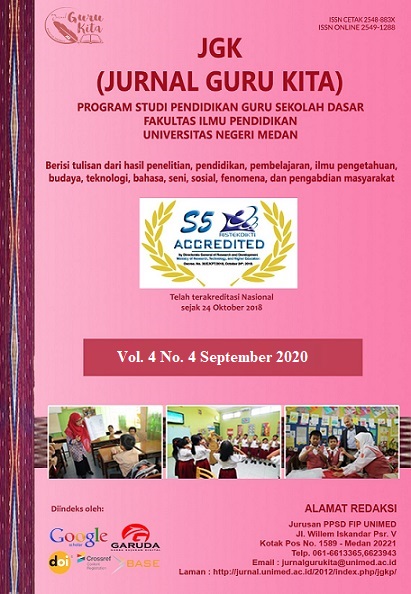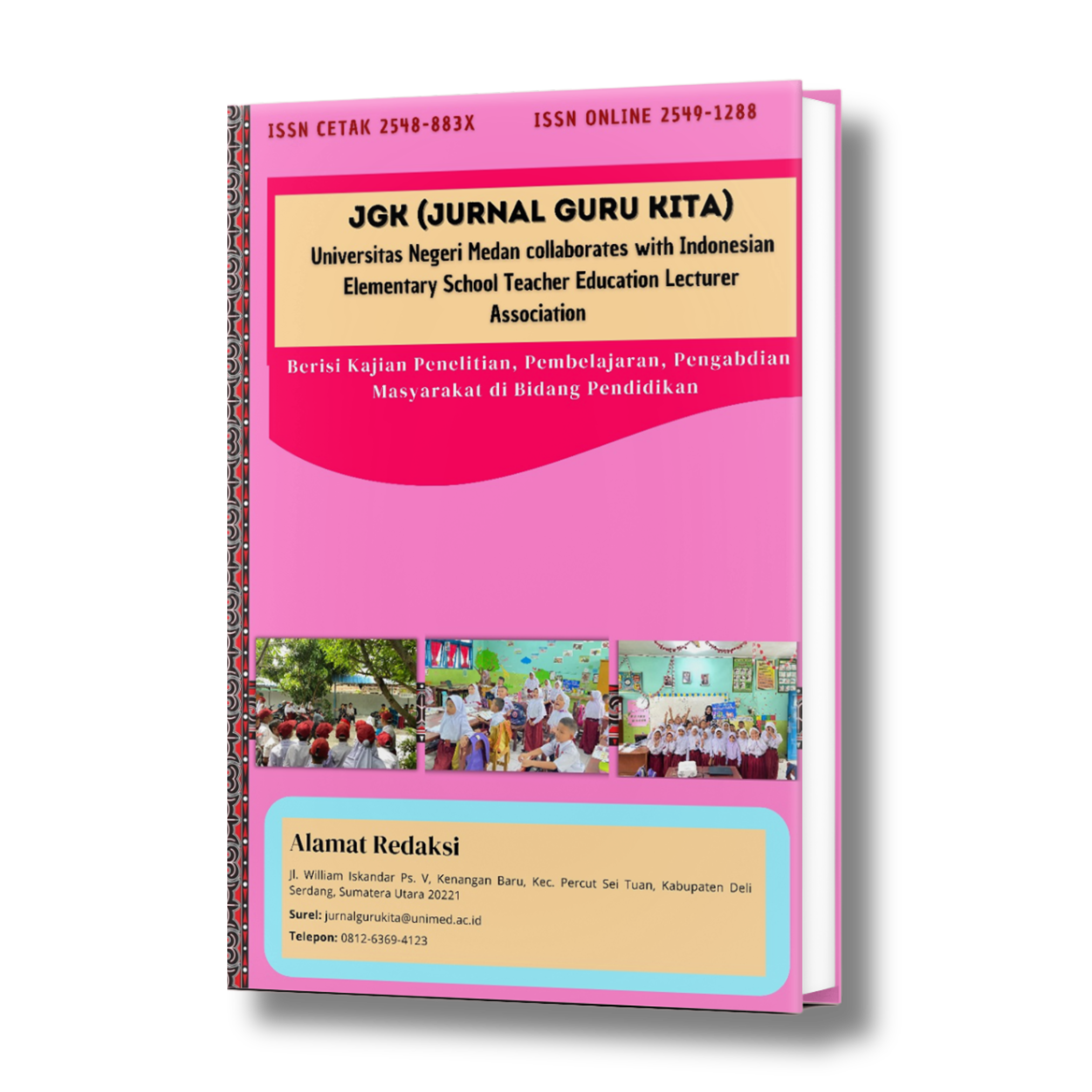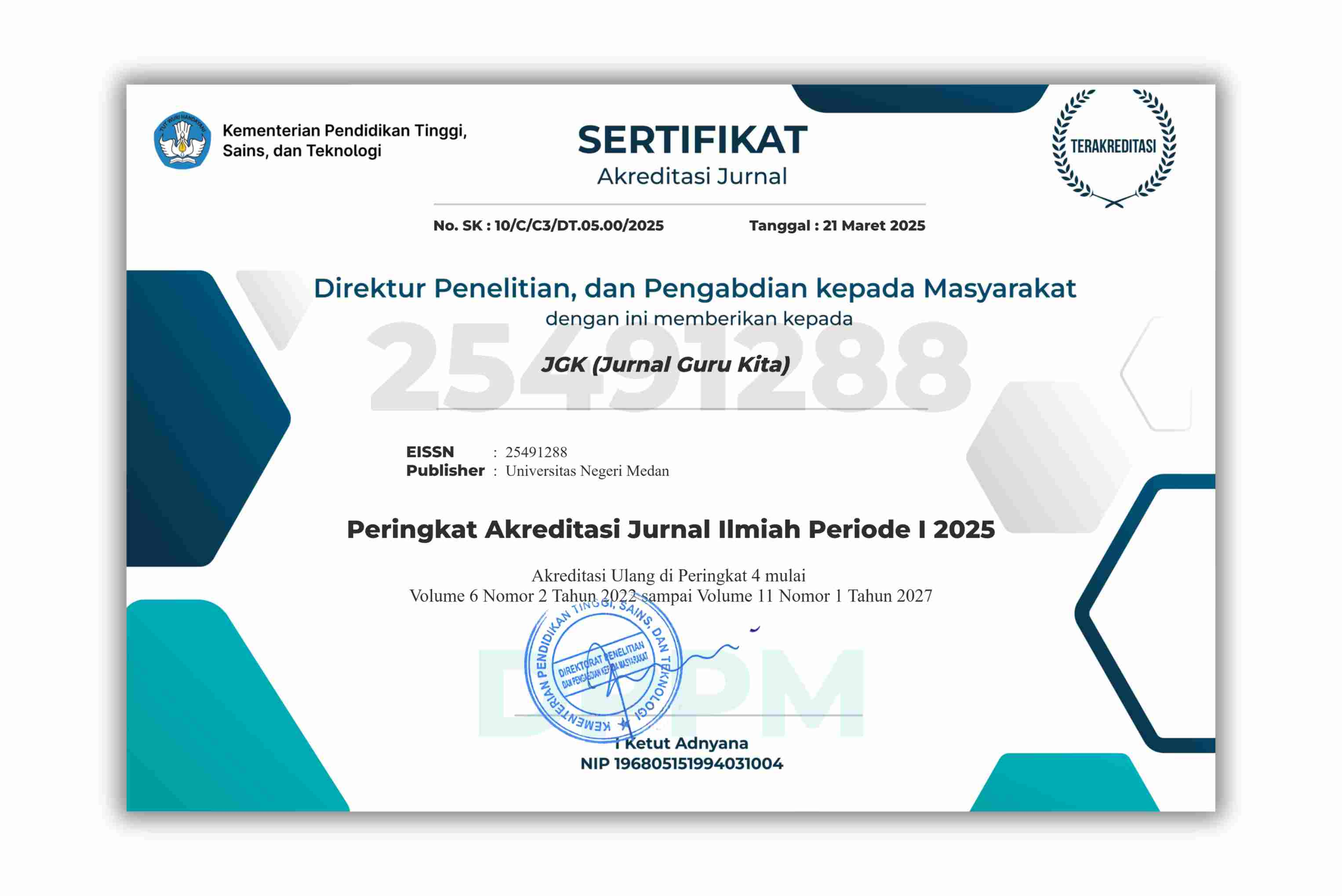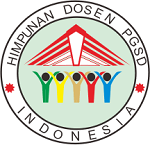APPLYING A GENRE BASED-APPROACH WITH AUDIO VISUAL AID FOR IMPROVING WRITING SKILL IN GRADE 11 STUDENTSOF MADRASAH ALIYAH NEGERI SERDANG BEDAGAI
DOI:
https://doi.org/10.24114/jgk.v7i2.36913Keywords:
Keyword, Writing Skill, Audio VisualAbstract
Abstract : APPLYING A GENRE BASED-APPROACH WITH AUDIO VISUAL AID FOR IMPROVING WRITING SKILL IN GRADE 11 STUDENTSOF MADRASAH ALIYAH NEGERI SERDANG BEDAGAI. The purpose of this study is To find out the effectiveness in applying a GBA with Audio Visual Media in Teaching Listening for improving writing skill in Grade 11 students in MANSB. The Subject of study was all of the 11th grade students of MANSB. This research procedure include is: Preparing a GBA learning model; Determining the class/treatment group, namely the control group and experimental group, Doing pre test, Conducting teaching and learning activities (KBM) in the experimental class and control class using GBA learning model, Doing Post-test, and Analyzing the data. The Result of study in the experiment class (Pre-Test) is 36 students, the majority of the them (11 students or 31%) get the core in the range of 52.51-60.00. and in the control class (Pre-Test) is 35 students, the majority of the students (13 students or 37%) get the score in the range of 50.01 - 60.00. The Result of study in the experiment class (Post-Test) is 36 students, the majority of the them (8 students or 22%) get the core in the range of 82.51 - 88.33. and in the control class (Post-Test) is 35 students, the majority of the students (12 students or 34%) get the score in the range of 62.51 - 70.00.References
Ali, S. S., &Ramana, V. L. (2018). œAcademic WritingChallenges at Universities in Saudi Arabia and Solutions.International Journal of English Language and Humanities, 4(10), 291-298.
Arikunto, S. 2010. ProsedurPenelitianSuatuPendekatanPraktik. Jakarta: RinekaCipta.
Batubara, F. A. (2017). œImproving Students™ Ability In Writing Of Announcement Through Gallery Walk Technique Of Eight Grade At MTs Jam™iyatulAlwashliyahTembung In Academic Year 2016/2017. Medan. UIN Sumatera Utara.
Boyle, J. P. (1984). œFactors AffectingListeningComprehension. ELT Journal, 38(1), 34“38. doi:10.1093/elt/38.1.34
Broughton, G. et al. (1980). Teaching English as a Foreign Language. 2th ed. New York: Routledge& Kegan Paul Ltd.
Brown, H.D. (2007). Teaching by Principles: An Interactive Approach to LanguagePedagogy. Longman. Retrieved on November 15 20017, from http://citeseerx.ist.psu.edu?viewdoc?summary?doi=10.1.1.468.7924
Cahyono, S. P. (2017). œThe Implementation of Genre Based Approach to Teaching Narrative Listening.Advances in Social Science, Education and Humanities Research (ASSEHR), volume 66.
Dahnianti, A. (2018). Using The Students™ Visit To Increase Their Ability in Writing Descriptive Text.Thesis. English Education Department, Education and Teacher Training, Muhammadiyah University of Makassar.
Derewianka, B. (2019). A RelevantPedagogicGrammar for Today™sClassrooms. Second handbook of English language teaching, 821-845.
Dirgeyasa, I. W. (2016). Genre-based Approach: What and How to Teach and to Learn Writing. English Language Teaching, 9(9), 45-51.
Dyaksa, Gede A.S., et al. 2018. œDeveloping Genre-Based Approach Instructional Video On Teaching English Based On Curriculum - 13 For Senior High School English Teachers.e-JournalJurnal: UniversitasPendidikanGaneshaJurusanPendidikanBahasaInggris.
Elashri, I. I.-E. (2013). The Effect of the Genre-Based Approach to Teaching Writing on the EFL Al-Azhr Secondary Students' Writing Skills and their Attitudes towards Writing. (Dissertation). Faculty of Education Departments of Method and Curriculum, Mansoura University, Mansoura.
Fuady, M. J. (2017). PengembanganAplikasiEvaluasiPembelajaranOnlineuntukPendidikanJarak Jauh. Tekno, 26(2).
Gintings, M. F.M. (2020). Promoting Students™ Writing Skill: Genre Based Approach in Indonesia EFL Context. Lexeme: Journal of Linguistics and Applied Linguistics Vol. 2 No. 1, 2020. Available online at http://openjournal.unpam.ac.id/index.php/LJLAL
Guan, X. (2010). Interactive Listening: Construct Definition and Operationalization in Tests of English as a Foreign Language. Chinese Journal of Applied Linguistics, 33(6), 16“39.
Harmer, J. (2007). The Practice of English Language Teaching, Fourth Edition. Pearson Longman: Harlow.
Haryanti, H., & Sari, F. (2019). The Use of Genre-Based Approach to Improve Writing Skill in Narrative Text at the Eleventh Grade Students of SMA Ethika Palembang. English Community Journal, 3(1), 280-288.
Hendrawaty, N. (2019). The Influence of Listening English Pop Songs to Improve Learners' Vocabulary at LKP Nuansa Jaya. Loquen: English Studies Journal, [S.l.], v. 12, n. 1, p. 56-65, july 2019. ISSN 2621-1998. Available at: http://jurnal.uinbanten.ac.id/index.php/loquen/article/view/1192Date accessed: 14 feb. 2022. doi: http://dx.doi.org/10.32678/loquen.v12i01.1192
Hidajat, I. (2015). Article. The Basic of genre-Based Approach: What to Do in Four Stages. https://ichsanhidajat.wordpress.com/2015/11/05/200/
Hidayati, K. H. (2018). Teaching Writing to EFL Learners: An Investigation of Challenges Confronted By Indonesian Teachers. Langkawi:Journal of the Association for Arabic and English, 4(1), 21-31.
Hyland, K. (2013). Genre-Based Pedagogies: A Social Response to Process. Journal of second language writing, 12(1), 17-29.
Insani, N. A. (2020). The Use ofInstagramto Improve Students™ writing Skills in Descriptive Text. Makassar: UniversitasMuhammadiyah Makassar.
Jou, Y. J. (2017). A Study of English Listening Strategies Applied by Technological University Students Department of Applied Foreign Languages. Cheng Shiu University
Martin, J. R., & Rose, D. (2012). Working With Discourse Meaning Beyond the Clause. London: Continuum.
Morton, T. (2010). Using a Genre-Based Approach to Integrating Content and Language in CLIL. Language use and language learning in CLIL classrooms, 81-104.
Neeraja, K.P. (2013).Text Book of Nursing Education, published by Jaype Brothers Medical Publisher.
Nordin, S. M. (2017). The Best of Two Approaches: Process/Genre-Based Approach to Teaching Writing. The English Teacher, 11.
Pratiwi, K. D. (2016). Students™ Difficulties in Writing English (A Study at the Third Semester Students of English Education Program at University Of Bengkulu Academic Year 2011-2012). Linguists: Journal of Linguistics and Language Teaching, 3(1).
Rajagopalan, U. M., &Jie, S. (2016, July). Adopting a SFL-Oriented Approach for Evaluating Genre-Based Academic Abstracts of EST Undergraduate Students in Japan. In 2016 international conference on advanced mechatronic systems (ICAMechS) (pp. 510-515). IEEE.
Rather,A.R, Essentials Instructional Technology, published by Darya gaj New Delhi. (2014)
Rea, Judy. (2020). Article. The Importance of Writing Skill: Why It Matters To The Student. Easy Reader &Penninsula. Retrieved from https://easyreadernews.com/the-importance-of-writing-skills-why-it-matters-to-the-student/
Renandya, Willy A. 2012. œFive Reason Why Listening Strategy Instruction Might Not Work With Lower Proficiency Learners. English Language Teaching World Online, Vol.3
Reszy, Y. H. (2013). Teaching Writing a Descriptive Text by Using Environmental Observation Strategy. Journal of English Language Teaching, 28-38.
Richard, J. (2009). Teaching Listening and Speaking from Theory to Practice.Cambridge: Cambridge University Press.
Risdayanti, R. (2020). The Using Pictures Series to Improve Students™ Writing Skills at the Tenth Grade Students of SMAN 8 Pinrang, English Department of Tarbiyah Faculty, State Islamic Institute (IAIN) Parepare (Doctoral dissertation, IAIN Parepare).
Samawiyah, Z., &Saifuddin, M. (2016). Phonetic Symbols through Audiolingual Method to Improve The Students™ Listening Skill. DinamikaIlmu: JurnalPendidikan, 35-46.
Selin, C. M., Rice, M. L., Girolamo, T., & Wang, C. J. (2019). Speech-Language Pathologists' Clinical Decision Making For Children with Specific Language Impairment. Language, Speech, and Hearing Services in Schools, 50(2), 283-307.
Serri, Fateme, et al. (2012). Cognitive, Metacognitive, and Social/Affective Strategies in Listening Comprehension and Their Relationships with Individual Differences. Theory and practice in Language Studies. DOI: http://dx.doi.org/10.4304/tpls.2.4.843-849
Sudjana, N. (2004). Dasar-dasar Proses BelajarMengajar. Bandung:SinarBaruAlgensido Offset.
Sugiyono. (2010). MetodePenelitianPendidikanPendekatanKuantitatif, kualitatif, dan R&D. Bandung: Alfabeta.
Syatriana, E. (2018). Implementing a Design Model in Teaching Writing through Reflection Strategy for Indonesian EFL Students. Senior Editor: Paul Robertson, 270.
Ulum, O. G. (2015). Listening: The Ignored Skill in EFL Context. International Journal of Humanities Social Sciences and Education. Vol. 2 Issue. 5 pp. 257-270
Yasuda, S. (2015). Exploring Changes in FL Writers™ Meaning-Making Choices in Summary Writing: A Systemic Functional Approach.Journal of Second Language Writing, 27, 105-121.
Downloads
Published
How to Cite
Issue
Section
License
Authors published with the JGK (Jurnal Guru Kita) agree to the following terms:
- Authors retain copyright and grant the journal the right of first publication with the work simultaneously licensed under a Creative Commons Attribution License (CC BY-SA 4.0) that allows others to share the work with an acknowledgment of the work's authorship and initial publication in this journal.
- Authors are able to enter into separate, additional contractual arrangements for the non-exclusive distribution of the journal's published version of the work (e.g., post it to an institutional repository or publish it in a book), with an acknowledgment of its initial publication in this journal.
- Authors are permitted and encouraged to post their work online (e.g., in institutional repositories or on their website) prior to and during the submission process, as it can lead to productive exchanges, as well as earlier and greater citation of published work. (See The Effect of Open Access)

























